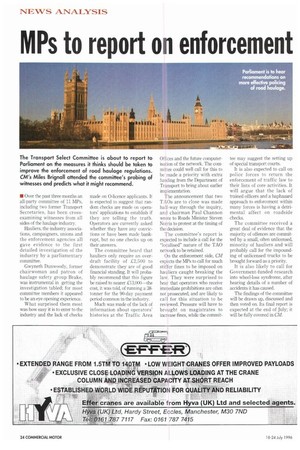Ps to report on enforcement
Page 26

If you've noticed an error in this article please click here to report it so we can fix it.
The Transport Select Committee is about to report to Parliament on the measures it thinks should be taken to improve the enforcement of road haulage regulations. CM's Miles Brignall attended the committee's probing of witnesses and predicts what it might recommend.
• Over the past three months an all-party committee of 11 MPs, including two former Transport Secretaries, has been cross• examining witnesses from all sides of the haulage industry.
Hauliers, the industry associations, campaigners, unions and the enforcement agencies all gave evidence to the first detailed investigation of the industry by a parliamentary committee.
Gwyneth Dunwoody, former chairwoman and patron of haulage safety group Brake, was instrumental in getting the investigation tabled; for most committee members it appeared to be an eye opening experience.
What surprised them most was how easy it is to enter to the industry and the lack of checks made on 0-licence applicants. It is expected to suggest that random checks are made on operators' applications to establish if they are telling the truth. Operators are currently asked whether they have any convictions or have been made bankrupt, but no one checks up on their answers.
The committee heard that hauliers only require an overdraft facility of 12.500 to demonstrate they are of good financial standing. It will probably recommend that this figure be raised to nearer £13,000--the cost, it was told, of running a 38tonner for the 90-day payment period common in the industry.
Much was made of the lack of information about operators' histories at the Traffic Area Offices and the future computerisation of the network. The committee could well call for this to be made a priority with extra funding from the Department of Transport to bring about earlier implementation.
The announcement that two TAOs are to close was made half-way through the inquiry, and chairman Paul Channon wrote to Roads Minister Steven Norris to protest at the timing of the decision.
The committee's report is expected to include a call for the "localised" nature of the TAO network to be retained.
On the enforcement side, CM expects the MPs to call for much stiffer fines to be imposed on hauliers caught breaking the law. They were surprised to hear that operators who receive immediate prohibitions are often not prosecuted, and are likely to call for this situation to be reviewed. Pressure will have to brought on magistrates to increase fines, while the commit
tee may suggest the setting up of special transport courts.
It is also expected to call on police forces to return the enforcement of traffic law to their lists of core activities. It will argue that the lack of trained officers and a haphazard approach to enforcement within many forces is having a detrimental affect on roadside checks.
The committee received a great deal of evidence that the majority of offences are committed by a small, often unlicensed, minority of hauliers and will probably call for the impounding of unlicensed trucks to be brought forward as a priority.
It is also likely to call for Government-funded research into wheel-loss syndrome, after hearing details of a number of accidents it has caused.
The findings of the committee will be drawn up, discussed and then voted on. Its final report is expected at the end of July; it will be fully covered in CM.












































































































